Hola mis amores!
Hola mis amores! El artículo de hoy es un poco diferente, porque ahora estoy en Bolivia – y mientras yo estoy aquí, he decidido que no voy a hablar nada de inglés. Sólo en español. Buena suerte para mí, no?
… Just kidding. To those who don’t understand the above, hopefully the title will have given you a clue.
I arrived in Bolivia three weeks ago – my fifth country in South America so far – and with that arrival came a change of travelling tactic. My Spanish has been improving steadily over the last eight months, but what with constant moving from place to place (plus a tendency to go out drinking quite a bit) I haven’t been giving the language quite as much attention as I could.
But Bolivia is one of the most renowned places in the continent to learn Spanish, so I thought I’d better buckle down and do just that. And because I like a challenge, I’ve taken it one step further.
It’s not just that I’m speaking a great deal of Spanish in Bolivia – I’ve decided that I’m not speaking any English.
…but of course, this is a slight exaggeration. Being a native English speaker, and someone who talks a LOT, the English language is somewhat unavoidable (although Benny at Fluent in Three Months would disagree). But as much as I can, I’ve been trying to stick to speaking Spanish in everyday life as much as possible.
So how does one go about a Spanish challenge like this?
(Because believe me, it’s a challenge and a half!)
Well. Taking Spanish classes and speaking to locals is an obvious starting point, but there’s a lot more to it than that.
1. Have a desire to speak Spanish
This is rather key – and also pretty self-explanatory, right? But you’d be surprised how common it is for people to think they have this desire. Until it gets to crunch time, and they realise they don’t.
“Oh yeah, I definitely want to be fluent; of course I’ll do all my homework and be proactive about practicing Spanish all the time!” said I, happily, before leaving England – only to discover that when I reached Ecuador, it was simply easier to lapse into English.
As we travelled through Ecuador, Peru, and Colombia, I thankfully became more interested in improving my language skills – and living with my Colombian friend Felipe for a week in Bogotá helped no end, as we agreed to only speak to each other in Spanish.
But then alcohol got involved, and it was suddenly a lot harder to remember how to conjugate verbs at 3am when making small-talk with strangers in the middle of a Colombian club.

Our mistake was starting the night with eight kinds of beer. I probably lost one tense for each bottle.
Sadly, I’ve come to the conclusion – for me, at least – learning Spanish has to be a burning desire; something that overshadows everything else.
Lucky, then, that I eventually went to Brazil and had the linguistic rug pulled out from underneath me. Suddenly being unable to communicate was a huge shock to my system.
I hadn’t realised quite how different Portuguese was going to be from my intermediate Spanish. I ached to speak with a semblance of ease; to be understood when I asked directions or what the price of toothpaste was. I couldn’t bear this new and unwelcome sinking feeling in my stomach when I approached a cash desk to pay for something, knowing I wouldn’t understand the numerical amount I owed.
For god’s sake – I didn’t even know my numbers in Portuguese!
I’m not sure whether this was through sheer idiocy, or if I stubbornly refused to absorb a single iota of the Brazilian language. Instead of attempting to subtly change the Spanish words I knew to fit the Portuguese, I spent a vast amount of time exclaiming how similar a Portuguese word sounded to the Spanish.
I actually missed the Spanish language like it was a person, and became its most stalwart defender.
So when the time came to head across the border to Bolivia, I was raring to go. Chomping at the bit. “Let me at those lovely Spanish-speaking people!” I kept saying to myself. Or something like that, anyway.
And the relief I felt as soon as I crossed the border was exactly as I’d hoped. Fluent or not, I was mentally prepared to throw myself back into the Spanish-speaking arena.
2. Pick a Spanish-friendly location to stay in
Being in Bolivia helps my challenge significantly, because people really don’t speak much English here. Unlike other countries in South America, it’s pretty difficult to get around without at least a smattering of Spanish, which means I’m less likely to lapse into English with Bolivian strangers. Temptation averted!
Then there’s the accent. Bolivia is recommended as a great place to improve your Spanish because Bolivians speak relatively slowly, don’t have many affectations, and pronounce their words with enough clarity for foreigners to understand.
But the Bolivian accent alone isn’t going to improve your Spanish skills. You’ve got to put some effort of your own in, too.
With this effort in mind, I decided to stay in a hotel for my first couple of weeks in La Paz.
Read more: My Ultimate Travel Guide to Backpacking Bolivia
Despite normally opting for hostels when I travel, I wanted my own space for a little bit – like the ability to sleep when I wanted, and the luxury of actually unpacking all my belongings for a bit. I do love the hostel life, but when you’re travelling long term it’s nice to get a bit of quiet time.
Ok, so the fact that a private room with an en suite bathroom was only £7 a night may have had something to do with it too.
But the biggest benefit to this decision? There was simply no need to speak English, to anyone. Where I’d normally be chatting away in English to fellow travellers in a hostel, I instead interacted solely with Bolivians.
A typical day at the hotel would involve thanking the woman who serves me breakfast in Spanish, and handing my key to the receptionist and have a quick chat, in Spanish. Talking to shop owners on my way to Spanish class in, you’ve guessed it, Spanish. And three hours of intensive classes later, when I eventually sit down in one of the many local restaurants for dinner, there’s no way I’m accidentally going to speak in English.
3.Take many, many Spanish classes
Taking two weeks of Spanish classes in Colombia were hugely helpful, but learning in a group sometimes made things tricky. While speaking with other learners really aided my ability to feel comfortable when speaking Spanish, it nonetheless was a slight hindrance when I didn’t completely understand something, but we moved onto something else anyway.
In La Paz however, I’ve opted for one-on-one lessons – and it’s a totally different ball game.
For three hours, I sit opposite Adriana in a little classroom, and we hash out my issues with her native language. It’s almost like a therapy session; there’s been laughter, tears and most certainly anger, as I’ve agonised over seemingly simple things that suddenly prove elusive, or new tenses that I simply cannot get my head around.
For at least fifteen minutes, I’ll ramble on about a ‘thema’ – in a particular topic, chosen by Adriana – and she’ll pick up on every word I get wrong. We’ll go through some new element of the language that appears totally overwhelming, and read a piece of text (usually a children’s story, even though we started off with Edgar Allen Poe), and I’ll repeatedly ask for the English definitions.
Eventually I’ll be set homework, tasked to write sentences using the vocabulary I’ve learned that class and the tenses I find most difficult.
And, more often than not, I leave a class feeling like my Spanish is worse than when I arrived.
But there’s a silver lining to all this.
Learning in such a proactive environment gives no room for error. Literally – because we won’t move on until I understand. Her constant repetition of my mistakes, while sometimes a knock to my confidence, means I eventually stop making them.
Moreover, I think I’d got complacent. I’d hit that language sweet spot where I thought I knew a lot, but in fact I was having the same conversations over and over again, and simply improving those specific sets of vocabulary in identical patterns.
It’s making my brain hurt – but I actually think I’m learning.
4. Force yourself to speak to every local possible
Apart from Spanish classes, I’ve settled into my version of Paceña life. La Paz is a common stop on the backpacker trail; known for its party hostels, some very traveller-friendly activities (like cycling down Death Road – which I have absolutely no desire to try!) and a rather infamous prison.
There aren’t as many long term travellers in La Paz though, unless they’re involved in volunteer work, or they’re improving their Spanish. It means that adopting the slow travel mentality in somewhere like La Paz is wonderfully simple. You’re not jostling for space amongst a myriad of foreigners; we’re few and far between, once you get out of the city centre’s tourist hub.
For my Spanish challenge, it also throws down the gauntlet for a lot of language practice, with vocabulary I most definitely don’t yet know.

Bargaining with the cholita women at the market; speak English and end up with nothing. Except a stare of death (this one was the last shot I took before my camera broke! Cursed?…)
At the opposite end of the spectrum to the normal “I am travelling in South America” phrases, I’ve asked directions from countless locals in order to search out beauty salons that offer eyebrow threading in La Paz (FYI? There is ONE. In the entire city), discussed the intricacies of my second broken camera with three different repair men, and talked to the local butcher about what he thought I should cook for dinner while he weighed out my sausages.
5. Think outside the usual Spanish box
These kind of interchanges are gold dust in the language learning process, as they make you realise just how redundant your lessons at school were.
Not for grammar and tenses (because those are like diamonds if you actually learnt them properly) – but in terms of conversation? You’re never going to chat to a Bolivian about what you do with your friends at the weekend or what your house looks like; you’re going to discuss the latest change to the law system, or why that group of teenagers were protesting in the street yesterday.
You start to realise, once you’re living a Spanish-focused lifestyle, that the clues to improving your grasp on the language are all around you.
And so you think outside the box.
Reading the local newspapers, mentally translating the adverts on the sides of buses and plastered to trees – even the telenovelas on TV are insanely useful! Although they’re also quite insane…
And that Kindle you’ve been travelling with for months? Why not download some books in Spanish to have a go at? Or, better yet, get something you already know and love on there – like Harry Potter, which I’ve read so often I know the plot backwards, so the Spanish isn’t half as difficult as it could be. Plus I’m adding a whole new collection of magic themed words to my vocabulary!
6. The peak of Spanish immersion: pretending you’re actually spanish
Of course, there are certain affectations of your own that you’ll adopt when learning Spanish in South America. Little things that make you feel more comfortable when trying to speak the language – like shortening ‘por favor’ to the common-in-Colombia ‘porfa’, or absorbing the local slang from places you visit and saying it at every opportunity.
Or the habit I adopted in Brazil, designed to allay my fears about not speaking a single word of Portuguese – which was pretending to be a Spanish speaker from somewhere else in South America.
This wasn’t quite as ridiculous as it sounds. More often than not, when I spoke Spanish at hostel receptions and ticket windows, people thought I was Argentinian. So after a few of these misconceptions were revealed to me, I thought, “why the hell shouldn’t I be from Argentina?!”
It was more than just pretending to be from a Spanish speaking country, though. I felt like being mistaken for Argentinian was akin to me passing a particular level in the Spanish game; I could apparently speak Spanish well enough that, even lthough I didn’t sound local, I could still pass for South American. And that was enough of a boost to keep me going.
If you want to speak Spanish, don’t stop!
The most important thing I’ve learned in this Spanish challenge, though, is the necessity to keep pushing through. I’m hell-bent on this idea that I’m going to be fluent before I leave South America. But it’s not enough to just want it to happen; I have to need to be fluent.
So I’ll keep spending my evenings with a mountain of Spanish homework in front of me (often accompanied by a glass of Chilean red to help things along). I’ll continue to talk nonsense to strangers on the bus, in restaurants and at street stalls, and I’ll even make the semi-terrifying vow to read the entire Harry Potter series in Spanish.
Because I’ve got such an opportunity to perfect my Spanish out here in Bolivia; in amongst the mountains and the teetering houses and the stunning photo-worthy scenes waiting around every corner.
And sitting above the city of La Paz, it felt like I had the whole of South America’s Spanish skill right in front of me. Ready for the taking.
Now I’ve just got to grab it.

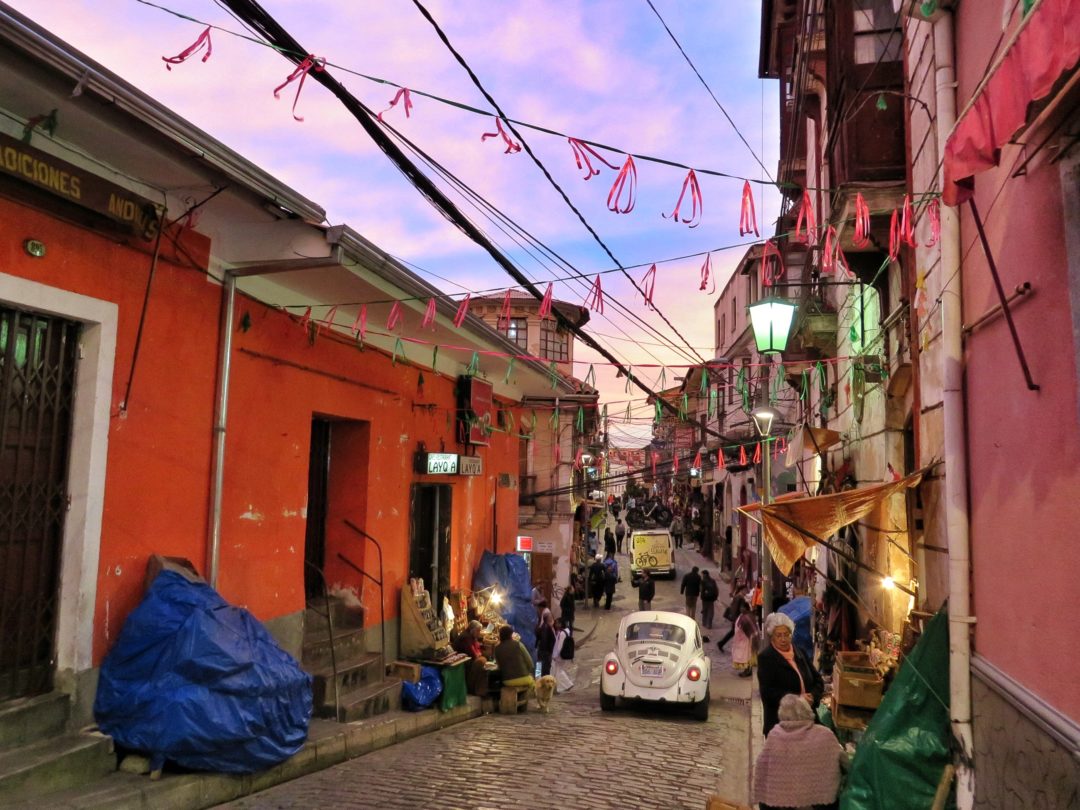
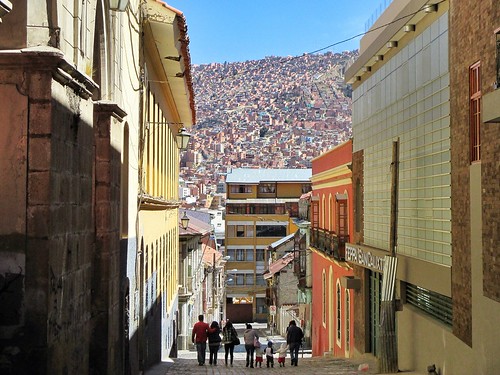
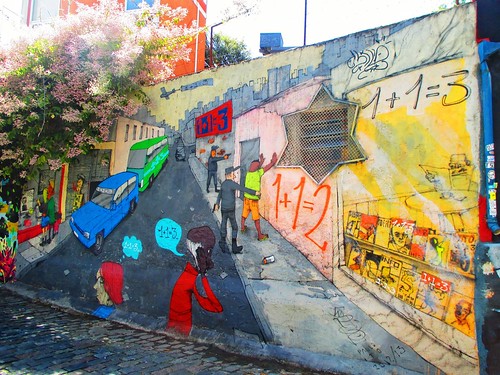
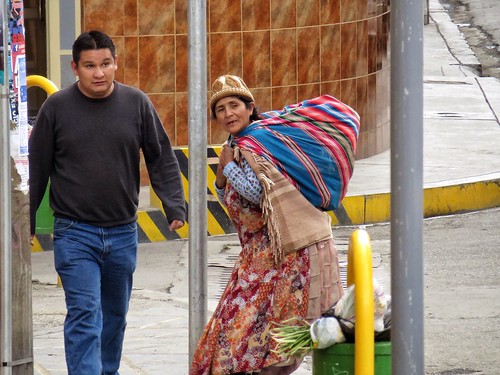
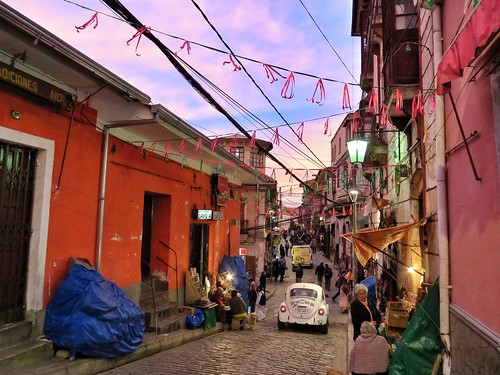

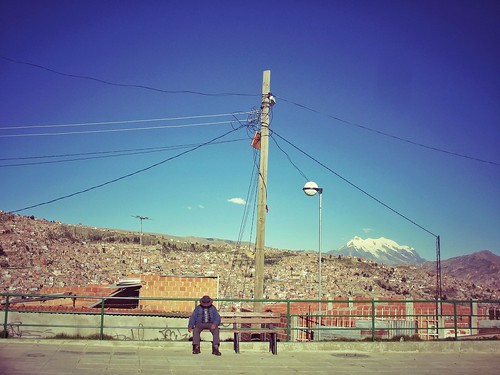

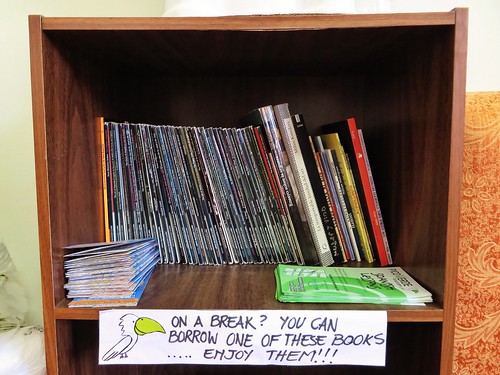
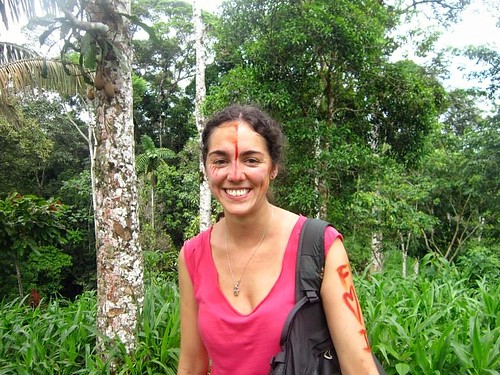
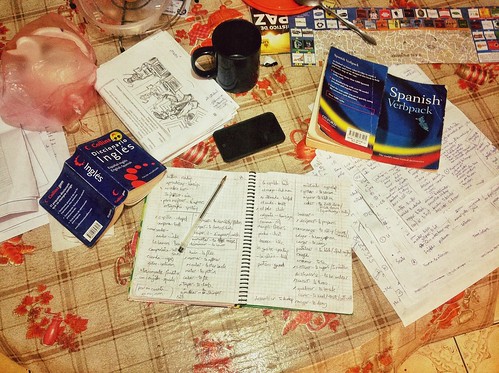
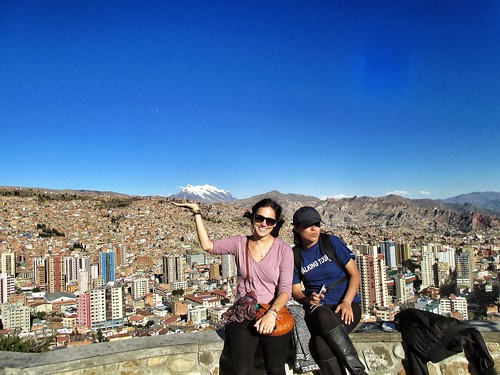



23 Comments
jessi
October 11, 2013 at 9:55 amTurkey is the same way. Outside of my job and the students I teach, virtually no one speaks English … or they just know random bits. You would think this would help me learn really quickly, which is true at least SOME of the time. I’ve picked up survival bits quickly, especially because our employer just started giving us Turkish classes this week (We’ve been here for 5 or 6 weeks already) …. but I still can’t make many sentences or really say a lot of meaningful things. Mostly I can just get basic information out of people.
The biggest obstacle is that I LITERALLY cannot stop speaking English here because it’s my job for 45-50 hours a week to teach students English.
And my biggest hurdle isn’t motivation or necessity — I NEED Turkish all over the place and I really want to be able to communicate — but rather time and energy. After working days, sometimes I feel like a vegetable.
But the important thing is to keep going at it, right? And I’ve got a 5 hour bus ride this weekend since we have a mini-break. That sounds like a good time to do some intensive studying 🙂
Flora
October 23, 2013 at 9:36 pmKeeping on going is definitely the most important thing Jess! And besides, you’re just at the start of your time in Turkey so it makes perfect sense that you haven’t picked up a huge amount yet.
Also it’s so much harder when you’re teaching English as your main focus (I’ve used that as my excuse for why I didn’t learn/speak that much Spanish in Ecuador..!) You’ll get there soon enough though, I’m sure 🙂
Alex B
August 19, 2015 at 1:42 amOh my gosh, but Turkish is SO much harder than Spanish! I’ve spent two months there and tried to learn Turkish, but man those words and sentence structure are just such a struggle. Also, most of the places I visited had a lot of English speaking people so I felt a lot of Flora’s struggle of not being able to practice (and my Turkish friends just giggling when I tried to pronounce something in Turkish…completely wrong usually).
colin farrel
October 11, 2013 at 10:53 amAS always, you have the best photos.
Flora
October 23, 2013 at 8:38 pmThanks so much Colin! Glad you like them – I do try! :p
Shaz
October 11, 2013 at 6:51 pmLovely post. I’m planning my next backpacking trip to South America and I’ve been trying to get motivated to learn Spanish. I’ve downloaded the Pimsleur but I feel like until I actually get there I may never have the NEED and DESIRE to go at it full force. Even then, I can see how it would be easy to continue speaking in English. I like your tips though, and I might try delving into some Spanish books and movies. Any suggestions?
Flora
October 23, 2013 at 9:39 pmSounds awesome Shaz! I’m afraid I never used that many resources for an extended period of time – I’ve basically gone down the “talking to locals is the best method for me” route. But I recently downloaded the entire series of Harry Potter books in Spanish because a friend said it had really helped him — so if you know a particular book or movie really well in English then it’s a great idea to then read/watch them in Spanish!
There’s also a ton of suggestions on my first post about learning Spanish – check out the comments under ‘Am I Incapable of Learning Spanish?’ for some potential ideas 🙂
TammyOnTheMove
October 12, 2013 at 3:27 amVery inspirational. I had three years of Spanish at upper school and even have a Spanish A-Level, but because I haven’t spoken it for 10 years I have forgotten everything. I am determined to learn Spanish again and am going to Ecuador for three months next year to take Spanish classes and volunteer for an NGO. I am hoping that those three months will be enough to bring back my Spanish to a half decent level. I want to at least be able to have day to day conversations. I think your tips about forcing yourself to speak Spanish is really important. Looking forward to follow your progress!
Flora
October 23, 2013 at 9:42 pmCheers Tammy, and your time in Ecuador sounds like it’s going to be fantastic!
Even if you haven’t used your Spanish for ten years I’m certain it’s still in the back of your head – particularly verb structures and conjugations. The more I practice them here, the better they stick in my head (and moreover, I become more aware of when the things I say aren’t right!) so I reckon it’ll come flooding back as soon as you get into a Spanish speaking country again 🙂
Leigh
October 12, 2013 at 11:26 amYep. Only way to learn spanish is to speak it. It’s part of the reason we chose to live in Salta. While we do have some English speaking friends, you will be very lonely and sad if you only speak English here.
Oh, but I’ll tell you. When you get to Argentina from Bolivia, suddenly the accent totally changes. It takes a while to get used to it.
Flora
October 23, 2013 at 9:50 pmHaha yeah I’ve heard the Argentinian accent a few times in different hostels – very different to Bolivian, that’s for sure! But I’ve been speaking Spanish in about five different South American countries so far, so hopefully I’m getting more used to different accents too 🙂
Renuka
October 13, 2013 at 6:30 pmI think it’s good learn a bit of the local language – it’s easier to communicate. Spanish is a cute language, I would love to pick it up some day!
Flora
October 23, 2013 at 9:51 pmIt’s definitely a great idea to learn at least a bit of the local language, you’re right Renuka! Good luck with your eventual Spanish learning 🙂
melomakarona
October 16, 2013 at 2:43 pmBuena suerte, amiga! Que disfrutas de Bolivia y America del Sur.
I completed an overland journey through Central and South America in February this year. When I arrived in Mexico 18 months before I pretty much knew nothing of Spanish, but nearly a year and half later, I considered myself pretty fluent. No classes or studying, simply forced myself to speak with locals by getting in cars with strangers haha 🙂
Bolivia…was one of the most memorable countries for me in South America. I met some of my favourite and least favourite people there…still one of my favourite countries though 🙂
Feliz viaje!
Flora
October 22, 2013 at 1:33 amAh muchas gracias por tus palabras! Your Spanish journey sounds wonderful – how many strange cars did you practice in?! :p
Much as I’d love to feel fluent without lessons, I know my brain needs at least some structures to hold onto and build on, so taking classes is the right choice for me. Plus it’s great to get an intense amount of exposure to different accents in different countries, not to mention learning a lot about the culture as a result. And as for Bolivia… it’s such a fascinating country. Quickly becoming one of my favourites too I think!
Coping with La Paz: a City of Cold, Colour and Contradiction
November 1, 2013 at 12:20 am[…] appear like a tourist to too many people. The hotel I'd chosen, because of its proximity to a recommended Spanish school, was unfortunately also a forty minute walk from my work at the artificial limb clinic – so […]
An All Night Long Dance with the San Pedro Cactus
November 8, 2013 at 4:31 am[…] don't know why I spoke in English to her. I'd been speaking Spanish all day during my tour of Lake Titicaca, but something told me it was the right thing to […]
Simone
March 30, 2014 at 9:21 pmJust found your website and it’s such a nice job and well I really liked this one post because of Bolivia. I was born there but raised in Barcelona, Spain.
Espero que te haya gustado mucho el país, yo nunca he estado en otra ciudad de mi país haha, una locura lo sé!. Espero que hayas conocido Santa Cruz (soy de allí). It’s a bit difficult to meet people in La Paz who speak English, but just go to the center or to Santa Cruz modern part and I am pretty sure you will find someone who does, but it’s really nice to practice it that much hard, have a nice day and all the best!!
XXX
Simone
best personal
July 14, 2014 at 9:08 amI’ll immediately grab your rss as I can’t find your e-mail subscription link or
e-newsletter service. Do you’ve any? Please let me realize in order that I may subscribe.
Thanks.
Gringo in Bolivia
August 24, 2014 at 2:39 amPrivate lessons are definitely the way to go. I did about 100 hours here in La Paz. Despite having spent over a year in Latin American countries and doing countless online and podcast study programs, I could only speak very basic Spanish until I took lessons.
Bolivia is a great place to learn for the cheap lessons and clear accent.
Flora
September 26, 2014 at 10:52 amYep, Bolivia is always one of my recommendations as a place in South America to stop for Spanish classes! Glad you agree 🙂
Kathy
January 27, 2015 at 1:56 pmHey awesome blog post! I’ve only been in La Paz for 3 weeks and already find myself nodding away to all your thoughts! I’m here volunteering and living with a local family who speak little to no English so hoping my Spanish will improve dramatically! Also started lessons so hopefully these help. More importantly 😉 I’ve been searching high and low for a beauty salon that offers eyebrow threading – to no avail! Can you remember where you found one and how much it was? Haha the joys of travelling and beauty upkeep! Gracias x
Flora
January 27, 2015 at 2:09 pmKathy, I totally know your searching pain! I was so happy when I found this place – it’s called Studio de Belleza Moulin Rouge, and it’s on Calle Batallón Colorados, which is the left hand turn just before Plaza Estudiantes if you’re walking down the Prado. They said they were the only place in La Paz that did threading when I asked, although that might have changed now.
Best of luck with your Spanish lessons too! If you have any problems with the school you’ve chosen I can definitely recommend classes at Pico Verde :p